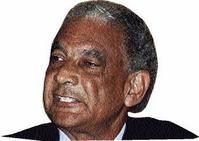Ken Jones, Contributor
Jones
One sniff of our public affairs and we might justifiably echo the remark of Marcellus in Shakespeare's Hamlet: "Something is rotten in the state of Denmark." And now the Great Danes of the PNP Opposition are barking and growling at 'Conflict of Interest' that never bothered them before. When the house was being broken the policy was: Let sleeping dogs lie; and lie indeed they did.
Nobody minds that the watchdogs are working. However, it seems the cantankerous canines are themselves suffering a bad case of 'Conflict of Views'. To illustrate the point I cite the row about the chairmanship of the Jamaica Tourist Board. This is a post that the PNP now feels is best served by someone who has no investment or personal interest in the vacation industry; and there are certain theorists, purists and nitpickers who agree because they are inherently suspicious of persons who are successfully engaged in commerce and industry.
Those who know and understand Jamaica's tourism are aware that the first chairman of the Tourist Board was Abe Issa, whose monumental achievements were responsible for the foundation on which the entire tourist business now rests. The period under his leadership is still regarded as 'The Golden age of Tourism' in which visitor arrivals rose from 86,000 in 1955 to 227,000 in 1962; and the industry's earnings increased 10-fold. At the time of his appointment he was owner/operator of two large hotels and he had a finger in many pies. That did not matter to the then PNP Minister of Trade, Wills O. Isaacs, who perceived no conflict of interest. In making Issa head of the board he remarked, "I know of no man in this country whose efforts have contributed more to our economy than Mr. Abe Issa."
Today's overzealous moralisers would have rejected Abe Issa and his valuable services because of so-called 'possible conflict of interest.' They would not have considered that this vague possibility was far outweighed by the tremendous advantages of entrepreneurship and experience. Happily, the realists prevailed and Jamaica got a most effective board, the members of which were all successful operators of some 'vital, directly participating section of the tourism business.' Tourism now faces a similar challenge in the search for enterprising and competent leadership.
Government proposes the illustrious, accomplished John Lynch for the post; and at once the PNP sees a 'possible conflict of interest'.
The Opposition has not presented an alternative or solution. However, we know how they handle 'conflicts of interest', especially when their ministers and supporters are concerned. They simply use Section 41 of the Constitution to make an exception to the rule.
The burden of Section 41 is that the seat of a member of the House or the Senate shall become vacant if he becomes a party to any contract with the Government of Jamaica for or on account of the public services. It also allows the member to get an exemption if his colleagues so determine. So it was in 1994 when the House permitted the then Minister of State for Tourism, Francis Tulloch, to do business with the Government through his firms Great River Rafting and Plantation Tours and East Hanover Development Association Ltd. No one thought it necessary to consider a 'conflict of interest'.
Also, in 1994 the Leader of the House went to the rescue of a member when his seat was threatened because his firm was engaged in underwriting Government bonds. No possible conflict of interest was perceived at that time. Nor was there anything to worry about when the brother of a minister of tourism received, without bidding, an exclusive contract to supply a government hotel with millions of dollars worth of furniture. Even now, with the furniture falling apart, there seems to be no conflict or remorse. And what about the Trafigura transaction in which a PNP minister received millions of dollars from a foreign firm to do a study concerned with matters within his portfolio? They made him quit the ministerial post but keep the Senate seat.
Wrongdoing
The Opposition's position on 'conflict of interest' indicates the need for us to examine the question as it relates to Jamaica, a small island in which business acumen, technical expertise and willingness to give public service do not abound. In addition, 'conflict of interest' by itself is nothing more than opportunity for possible wrongdoing. Honest persons do not fall prey to this or any other criminal temptation.
The crook who wishes to exploit and benefit from power and position will always find ways and means to indulge his selfishness through embezzlement, extortion, graft, bribery and other forms of corruption. Life has to go on despite these possibilities; and I fail to see how we can justify a crusade against possible conflict of interest while meekly accepting actual corruption and human rights abuses that have been suffocating the country.
Jamaica has long suffered because governance has been left to professional politicians, many of whom do not qualify to hold responsible positions in any progressive private enterprise. The captains of commerce and industry are often scorned, despite the fact that it is largely by their efforts that productive jobs are created, goods and services provided and the bulk of taxes paid to enable Government's viability.
I have long criticised the fact that organised labour has been forced, more often than not, to play a minor role in government here; and I applaud the fact that the present administration appears to be formulating a good mix of labour, capital and the professions. I absolutely refuse the companionship of those who base their judgment on the shallow perception that successful business people, creating wealth and employment are only looking out for themselves and should not be trusted. This is a manifestation of mental slavery and it is time for Jamaicans to break free of this chain of backward thinking.
Ken Jones is a veteran journalist and general secretary of the Farquharson Institute of Public Affairs.

